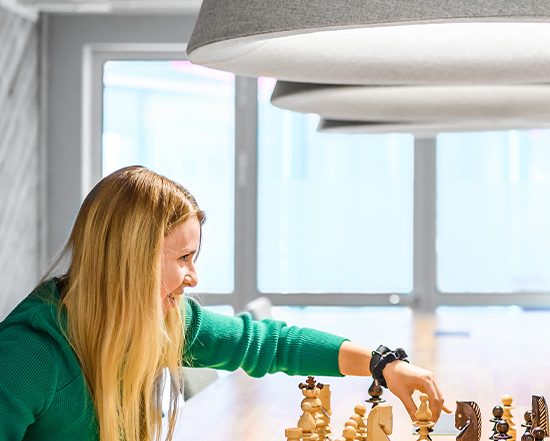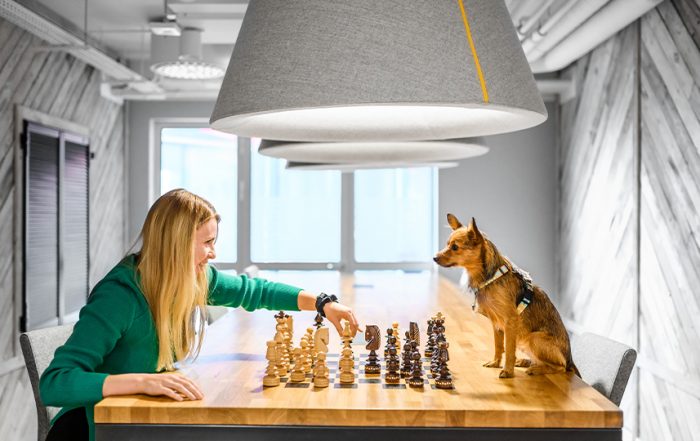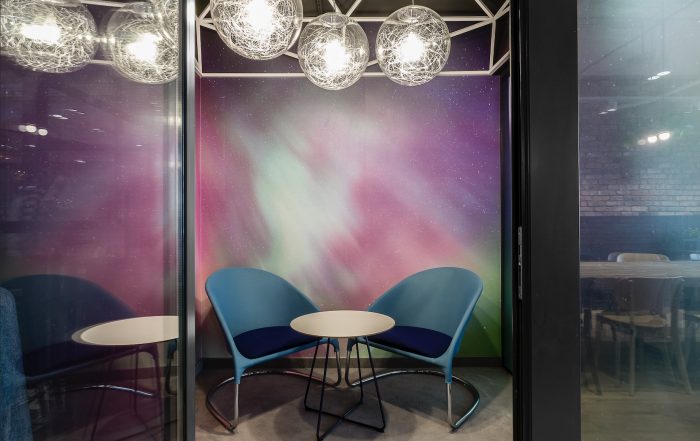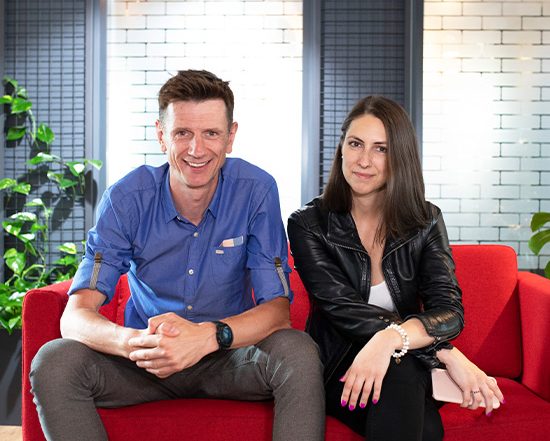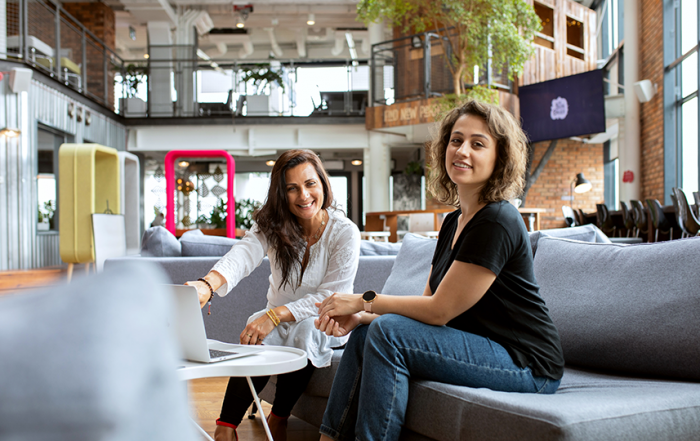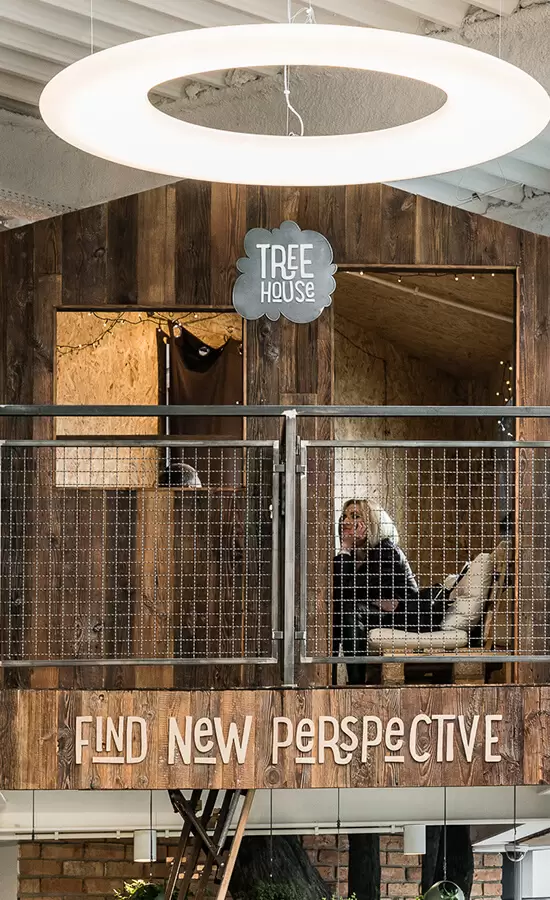
What now with the homeworking and co-working in pandemic times?

"A desk in a co-working space is the future of remote working. It will be another benefit, next to a medical plan or a sports card."
Interview by Kamila Kalińczak, Institute of Good Life
“Due to restrictions, many offices will have to be remodelled, which might make companies more prone to buy access to desks in a co-working space for their employees rather than invest in refurbishment. After all, they already buy them medical plans or sports cards”, says Monika Kaczmarczyk from Brain Embassy.
Kamila Kalińczak talks to Monika Kaczmarczyk, Managing Director of Brain Embassy, a so-called coworking space offering offices and desks to let for teleworkers, and with Kasia Wojnar, Concept Designer at Brain Embassy.
We were supposed to meet before the pandemic and talk - among other things - about the competencies of the future. Meeting now though, what are the competencies most valuable today?
MK: Trust.
Trust? You surprised me!
MK: The ability to trust your employees, a flexible approach to your work, energy management and appropriate organisation of one’s calendar.
We used to laugh at the hours spent in conference rooms. Today we are joking that what used to be doable with one email requires an hour-long online meeting today.
MK: I have to admit that it is hard for me to understand because the way you organise your calendar is key in remote working. I’ve heard about people who spend whole hours at meetings without taking any breaks between them. Mind you, they are not able to prepare for all those meetings.
Plus, attending one meeting after another without being prepared makes them hardly efficient. Just as assuming that we will meet for an hour to discuss something. I meet with my team to get something done and if it takes fifteen minutes, everyone gets back to their duties.
KW: At the beginning of the pandemic our team chose one of popular meeting applications, which everyone got to like and thanks to which our work goes really smoothly now. Most companies use only the online meeting feature, while the app can also be used for text editing, presentations, reports, and much more efficiently than by sending it all via email to boot. But that’s not the most important. The biggest challenge of this new reality will not be about choosing the right tools but about the attitude to work in general.
Many leaders had attended trainings on a flexible attitude to work, projects, employees (the so-called agile management) and here comes the moment to check what they learnt.
How to check it?
KW: It is very strongly connected with the trust towards employees that Monika talked about. Trust is the basis of every healthy relationship, also at work. Thanks to trust, a team can develop as it encourages critical thinking and expression of opinions. If I ask any leader if he or she is flexible towards their employees, they will surely say they are. In their declarations everyone is.
But in practice many leaders have problems with trusting the people they hired. They are afraid that out of office employees spend less time at the computer or that they are less efficient. This fear in turn brings excessive reporting and control over employees, that is, the so-called micromanagement.
What does it mean?
MK: Micromanagement is about breathing down your employee’s neck with every step they take. I heard that there are already applications which can even save the data from an employee’s computer to find out how much time they spent on what. I can’t imagine myself controlling my team this way! To me it would simply be a loss of time which I would prefer to devote to business development. And for employees it means more unwanted pressure. Trusting your employees has become a competency of the future. Someone who breathes down their employee’s neck is not a leader, that’s what managers are for. A leader should look more broadly and develop the business. Watching people is no business development, and for some reason people confuse the two.
KW: The pandemic has shown that we can learn a tool fast but it will be a challenge to change the way of thinking, and likewise strategy planning for businesses. It will be hard now to devise five-year development plans as was the case before. Another important competency of the future is gaining importance here: resilience, that is, the ability to adjust to the changing conditions. But we, the Polish people, should not have problems with the latter as it is in our blood.
I wonder where you got this ease in trusting employees. Is it because for you remote working is nothing new?
MK: My team has always been remote working and I have never seen anyone abusing this situation. But I definitely see how these people develop their creativity when they have leeway. Coworking spaces, such as Brain Embassy, are the future of large-scale remote working, providing fully ergonomic solutions and comfortable conditions which substantially increase effectiveness at work.
KW: I remember articles about remote working programmers from years ago. We used to notice it but no one jumped at letting their employees go home.
It all changed after the 2008 crisis when spaces with desks to let, that is coworking spaces, started to pop up on the market like mushrooms as people set up their companies, their start-ups, and did not want to work from home. Suddenly it turned out that remote working gives new employment possibilities as it makes it possible to reconcile the work of people living in different time zones. Today, it’s a norm.
Will it be similar now?
MK: We expect many corporations to relocate their employees to us. With restrictions concerning social distancing many offices will require remodelling, so it is probable that companies will want to take advantage of more flexible solutions, offering a coworking package to their employees, just as they buy them medical plans or sports cards.
KW: We need to remember that not everyone sees remote working as pleasure. Not everyone is able to find space for work, many people have small children. An employer cannot expect that an employee will work from home as the former does not know what conditions the latter has at home. I won’t hide that we see it as an opportunity for shared office spaces.
Plus effectiveness is a challenge.
KW: Effectiveness depends on many factors - the competencies of employees but most of all - our mental and physical wellbeing. One employee might need two and another - four hours to prepare a presentation. But even the former employee might come to the office but have an off day and will then spend more hours over this presentation - he or she will be less effective on this particular day, but on another day - they will do more than they assumed.
MK: Which brings us back to flexibility. It is true that there are employees, especially those with jobs requiring creativity, who like to work late as their best ideas come to mind in the evening. That is why I am not a fan of a stiff nine-to-five working day. The most important thing is to wisely manage your energy rather than time.
And how will the future look like?
KW: It is possible that an employee might not want to spend so many hours on commuting anymore and such spaces will not develop in business centres, but in the outskirts of the city.
It is possible that employees will soon wake up in the morning, check their app with a list of all their coworking spaces, choose the one with the cleanest air on that day and activities interesting for them, such as morning yoga or lunch with their coworkers. Because innovations really don’t come into being at a desk.
Monika Kaczmarczyk - Managing Director of Brain Embassy.
Kasia Wojnar - Concept Designer, initiating and cocreating projects related to the design, community, programming and communications of Brain Embassy.



